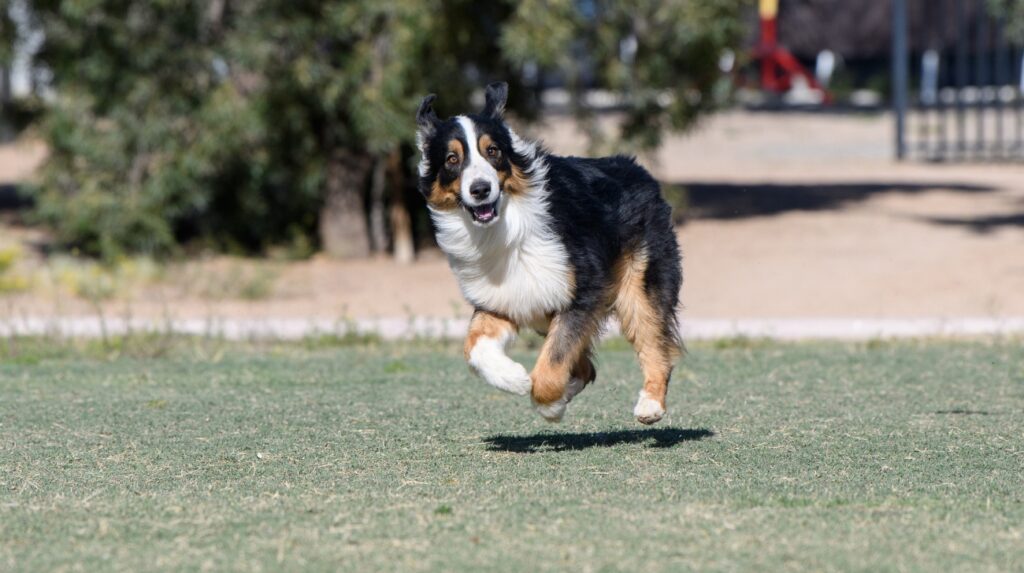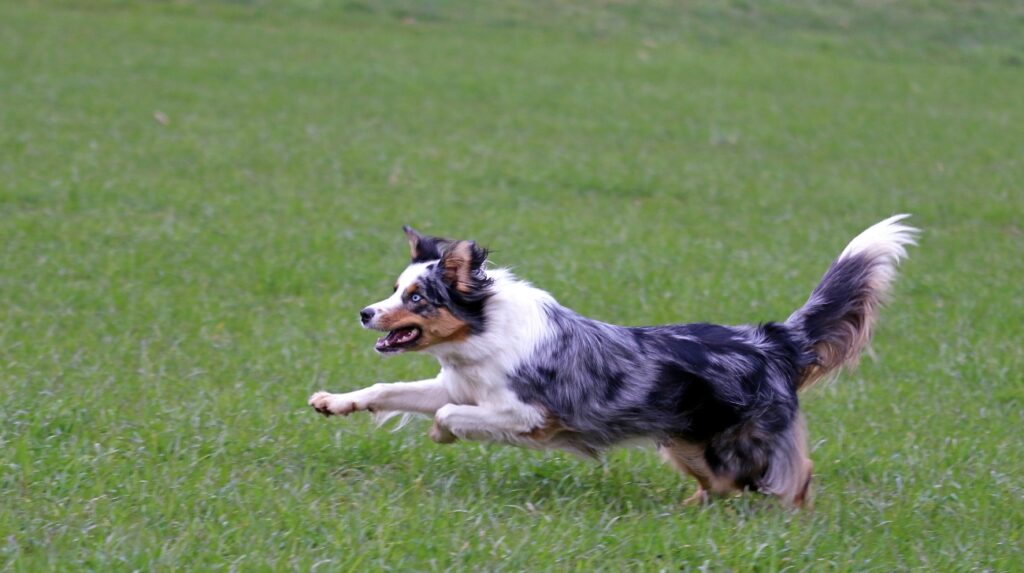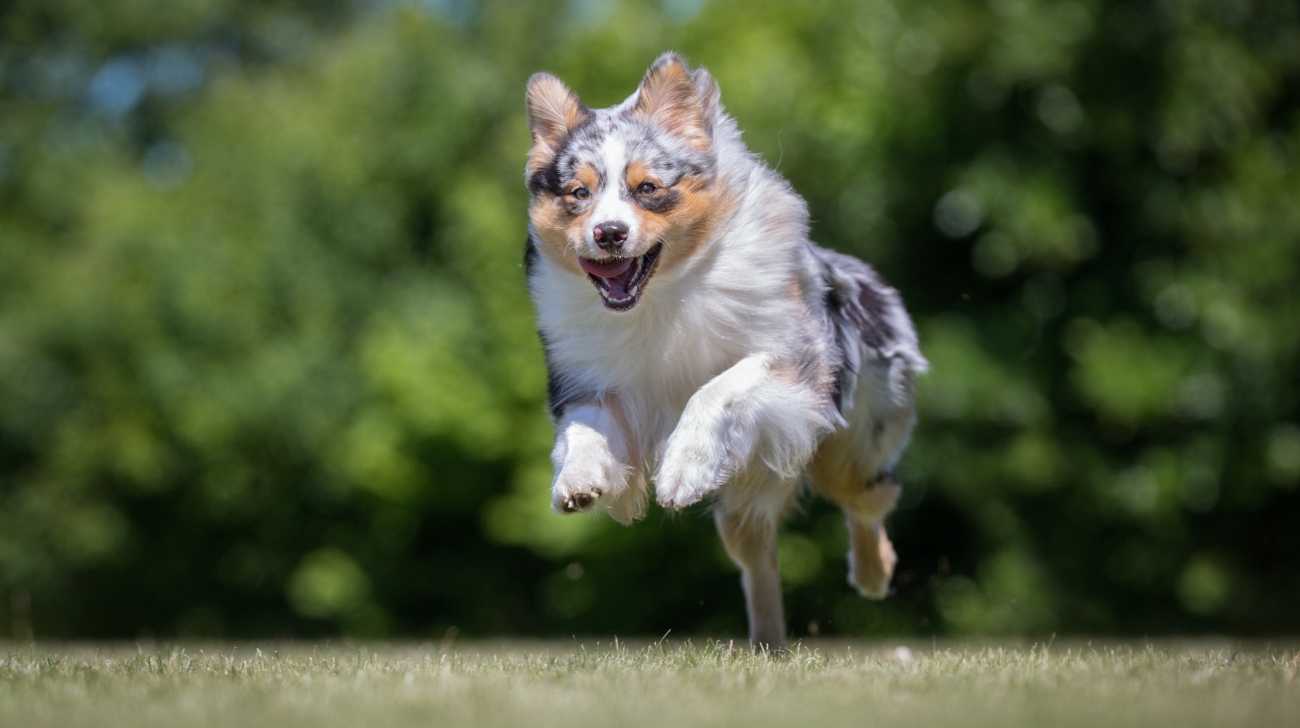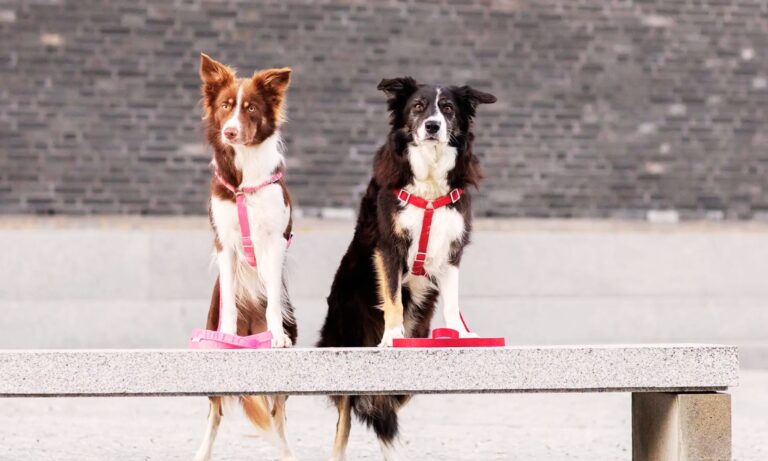Australian Shepherds are energetic, intelligent dogs that tend to bark more than some other breeds. While barking is a natural form of communication, excessive barking can become frustrating. To address this, it’s essential to first understand the reasons behind their barking and then implement targeted strategies to manage it. So, How do I get my Australian Shepherd to stop barking? Get the perfect fit with this guide on what size collar you need for an Australian Shepherd to ensure both comfort and control for your active dog.
Blog Highlights
ToggleWhy Do Australian Shepherds Bark So Much?
So, How do I get my Australian shepherd to stop barking? Australian Shepherds are known for their alertness and protective instincts, which means they often bark to warn their owners of perceived dangers, like strangers or other animals.
However, they also bark out of boredom, frustration, or when they need attention. Understanding the root cause of your dog’s barking is the first step toward managing the behavior effectively. Find the perfect collar for your pup by exploring different types of dog collar belts suited for various needs.

Quick Fix For Australian Shepherd Barking
How to Stop Your Australian Shepherd from Barking?
Managing an Australian Shepherd’s barking requires patience, consistency, and a solid understanding of their needs. By ensuring they get plenty of physical exercise, mental stimulation, and consistent training, you can greatly reduce their tendency to bark excessively. Here’s how to stop it:

1. Provide Plenty of Exercise
Australian Shepherds are high-energy dogs that require significant physical activity to stay healthy and content. A lack of exercise is one of the primary reasons for excessive barking in this breed.
Ensuring your dog gets at least 30-60 minutes of daily exercise will help burn off excess energy and reduce boredom-induced barking. Activities like long walks, fetch, and agility training can help tire your dog out and make them less likely to bark.
2. Mental Stimulation
Because Australian Shepherds are so intelligent, they require mental as well as physical stimulation. Puzzle toys, interactive games, and obedience training can help keep their minds busy and reduce the urge to bark out of boredom.
Dogs who are mentally challenged and engaged tend to be quieter and more content. Incorporating toys that dispense treats or engaging them in activities like scent games can work wonders in calming excessive barking. Make your dog stand out with customized collars with their name, combining style and safety.
3. Teach Commands like “Quiet”
One of the most effective ways to reduce barking is through training. Teach your Australian Shepherd to obey the “quiet” command by rewarding them for stopping barking when instructed.
Start by allowing your dog to bark a few times, then say “quiet” in a firm but calm voice. When they stop barking, immediately reward them with treats or praise. Over time, they will associate the word “quiet” with the action of stopping their barking.
4. Desensitization and Counter-Conditioning
If your Australian Shepherd tends to bark at specific triggers—like other dogs, strangers, or loud noises—desensitization can be a great method. Gradually expose your dog to the trigger from a distance, rewarding them for staying calm.
Slowly decrease the distance over time, continuing to reward their calm behavior. Over time, this process will help reduce their reactivity and barking when exposed to those triggers.
Counter-conditioning is another technique that pairs the trigger with something positive, like treats or toys, to help your dog develop a more positive association with the stimulus.
5. Consistency in Routine
Australian Shepherds thrive on consistency. Establishing a daily routine for exercise, feeding, and playtime helps them feel secure and reduces anxiety, a common cause of barking. When a dog knows what to expect, they are less likely to act out.
A consistent schedule for walks, meals, and training will give your dog a sense of structure, which can prevent unnecessary barking. It’s important not to unintentionally encourage barking.
If your dog barks to get your attention or demands something (like food or to go outside), don’t immediately respond to them. Wait until they stop barking, then reward them for being quiet. If you give in to their barking, they’ll learn that it’s an effective way to get what they want.
6. Create a Calm Environment
Creating a peaceful and quiet environment can help reduce barking caused by stress or overstimulation. Set up a designated quiet area for your dog, such as a crate or a cozy corner with a bed and toys.
This “safe space” can help them feel secure during times of anxiety, such as when there are loud noises or visitors in the home. Adding soothing background noise like soft music or white noise can further help calm their nerves.
Many Australian Shepherds are highly attached to their owners, which can lead to separation anxiety when left alone. This anxiety can manifest as excessive barking. To combat this, try leaving your dog for short periods and gradually increase the time you’re away, so they learn to be comfortable on their own. Giving them toys or treats when you leave can create positive associations with your departure.
7. Seek Professional Help if Necessary
If your Australian Shepherd’s barking persists despite your efforts, consulting with a professional dog trainer or behaviorist may be beneficial. They can provide personalized training strategies and address any deeper behavioral issues that may be contributing to the excessive barking.
The Role of Socialization in Reducing Barking
One of the most crucial aspects of managing excessive barking in Australian Shepherds is proper socialization. Given that Aussies are naturally alert and protective, they tend to bark at unfamiliar people, animals, or situations.

Without proper socialization, this behavior can become excessive and disruptive. Socialization helps reduce unnecessary barking by making your dog more comfortable and familiar with different environments, people, and stimuli. Looking to start training your puppy with a shock collar? Here’s how to do it correctly and safely.
What Is Socialization?
Socialization is the process of exposing your Australian Shepherd to a variety of experiences in a controlled and positive manner. This includes meeting new people, encountering different animals, experiencing various environments, and hearing different sounds.
The goal is to ensure that your dog remains calm and relaxed in a wide range of situations, ultimately reducing their urge to bark out of fear, anxiety, or over-excitement.
Why Socialization Is Important for Australian Shepherds?
Australian Shepherds are a highly intelligent and active breed, traits that make them excellent working dogs but also prone to over-reacting when not properly trained. Due to their herding instincts, they are naturally protective of their family and territory. Without proper socialization, they may bark excessively when faced with anything unfamiliar.
- Reducing Anxiety and Fear: One of the main reasons dogs bark excessively is because of anxiety or fear. If they haven’t been properly socialized, they may perceive everything outside their home environment as a threat. This can lead to barking at new people, other dogs, or loud noises. Socializing your Australian Shepherd from a young age helps them understand that new experiences aren’t dangerous, which in turn reduces fear-based barking.
- Building Confidence: A well-socialized dog is a confident dog. When your Aussie feels comfortable in different environments and situations, they are less likely to bark out of uncertainty. Socialization provides opportunities for your dog to learn how to behave calmly, even in situations that would have previously triggered barking.
- Preventing Territorial Behavior: Australian Shepherds can be highly territorial, barking to warn their owners of intruders. Socialization helps your dog understand that not all unfamiliar people or animals are threats, helping to reduce territorial barking.
How to Socialize Your Australian Shepherd?

- Start Early: Socialization is most effective when started early, ideally when your Australian Shepherd is a puppy. Exposing them to a variety of experiences during their formative months helps them develop a balanced and calm personality. However, even adult dogs can benefit from socialization, though it may require more patience and time.
- Introduce New Experiences Gradually: When socializing your Australian Shepherd, it’s important to introduce new experiences slowly and positively. Begin with low-stress situations, such as meeting one new person at a time or going for walks in quieter areas. Gradually increase the level of exposure to busier environments or more unfamiliar stimuli, like crowded parks or traffic.
- Positive Reinforcement: Reward your dog with treats, praise, or play whenever they remain calm in a new situation. This positive reinforcement helps your dog associate new experiences with good things, reducing the likelihood of barking due to stress or anxiety.
- Expose Them to Different Environments: Take your dog to various places to help them become accustomed to different sights, sounds, and smells. Bring them to the park, on car rides, or even to pet-friendly stores. The more environments they experience, the less likely they are to bark at unfamiliar ones.
- Meet New People and Animals: Encourage your Australian Shepherd to meet new people and other dogs. Socializing with different people—of all ages, sizes, and appearances—will help reduce their tendency to bark at strangers. Similarly, controlled introductions to other animals will help reduce barking during encounters with dogs, cats, or other creatures.
- Use Desensitization Techniques: For Australian Shepherds that are already showing signs of excessive barking due to lack of socialization, desensitization can be very effective. Start by exposing them to their barking triggers (like other dogs or strangers) at a distance, rewarding them when they remain calm. Gradually decrease the distance over time, always rewarding good behavior. This helps your dog learn that they don’t need to bark in response to these stimuli.
- Puppy Classes and Obedience Training: Enrolling your dog in puppy classes or basic obedience training is an excellent way to expose them to new situations while teaching them essential commands. These classes offer controlled environments where your dog can meet new dogs and people, all while learning how to behave appropriately.
Socializing an Adult Australian Shepherd
While it’s easier to socialize puppies, adult dogs can also benefit from this process. The key to socializing an adult Australian Shepherd is patience. Start slowly and gradually introduce them to new environments and situations.
Adult dogs may take longer to adjust to unfamiliar stimuli, so go at their pace and reward calm behavior consistently. It may also be helpful to consult a professional trainer or behaviorist if your adult dog shows signs of anxiety or fear that lead to excessive barking. Learn when to start e-collar training and ensure your pup is ready for this next step in training.
The Long-Term Benefits of Socialization
The long-term benefits of socializing your Australian Shepherd are significant. Not only will your dog bark less, but they will also be more confident, well-behaved, and easier to manage in various situations. A well-socialized dog is less likely to develop behavioral issues such as fear-based aggression, separation anxiety, or destructive behavior—all of which can lead to excessive barking if left unchecked.

Additionally, proper socialization strengthens the bond between you and your dog. By helping your dog navigate new experiences calmly and confidently, you build trust and communication, which makes training easier and enhances your relationship.
Wrapping Up!
Additionally, teaching commands like “quiet” and addressing any underlying anxiety or stress will help create a calmer and more peaceful environment for both you and your dog. With time and dedication, your Australian Shepherd will learn when it’s appropriate to bark and when it’s time to stay quiet.
Hope so, now you know the answer to: How do I get my Australian shepherd to stop barking? Discover the best shock collars for training puppies, with top picks designed for effective, safe use on younger dogs.





